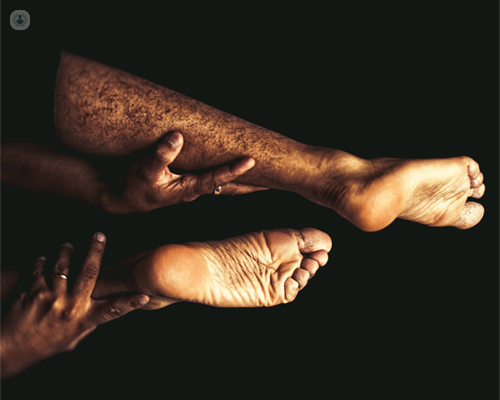Gout: understanding the condition and its triggers
Written by:Gout is a type of arthritis that appears when there is a build-up of uric acid in the blood which causes joint swelling. Revered consultant in rheumatology and general internal medicine Dr Ziad Farah, who treats patients in London, shares his expertise on the condition. He discusses the causes, triggers, management, and much more.

What is gout?
Gout is one of the most common inflammatory arthritis conditions. It is caused by the accumulation of excess uric acid in the joints, leading to inflammation, and can be very painful.
Who is at risk of gout?
Men are four times more likely to be affected by gout than women. It’s much more common in older patients and tends to affect patients who are overweight, have another medical problem, such as chronic kidney disease, consume excess alcohol, or who are genetically predisposed to the condition.
Why does it occur?
Gout occurs due to a build-up of uric acid crystals. Essentially, our body produces uric acid as a normal chemical. Everyone has a certain amount of uric acid in their body. Some people, however, may produce too much uric acid, for one of many reasons. The excess can’t be dissolved in the blood or fluid of the joints, as normal. This causes crystals to form, similar to, for example, putting too much sugar in a small amount of water. Eventually, the sugar stops being dissolved and you end up with little crystals.
Your immune system does not like these crystals being in the joints and it recognises them as being abnormal. The immune system's response to these crystals is to target them with inflammatory cells, which results in inflammation, which presents as an arthritis.
What are the signs and symptoms of gout?
Gout tends to be very painful. Typically, it affects the first toe because the toes are colder than the rest of the body and the uric acid crystals tend to form more easily at a lower temperature. Patients often complain of very sudden onset; pain, swelling, and redness of the affected joint.
At times it can be so painful that patients have reported putting on a sock as being unbearable. The episode will start suddenly and last for five-to-seven days before ending suddenly. Patients with a history of gout will report having many episodes recurrently. It can occur in different joints as well, but most commonly in the toe and ankle.
Why does gout cause more pain at night?
Gout can occur at any time of day, but it is more common at night as our bodies, and our feet, in particular, tend to be a bit cooler. Typically, we are also less hydrated due to sleeping for many houses. As a result, that means uric acid crystals can form easily which triggers the immune system.
What else triggers gout attacks?
Gout attacks can be triggered by many different things. Diet is a major contributor and foods that contain too much uric acid, like red meat or shellfish, will put patients at risk. Excessive alcohol consumption and certain medications, like water tablets or blood pressure medications, can also result in higher uric acid. It's also important to note that having another infection, a history of trauma to the joint, or even too much stress can trigger an attack. It's also worth bearing in mind that sometimes patients have no obvious trigger, they just have too much uric acid and it triggers off inflammation.
Can gout be cured?
Gout is considered a chronic condition because treatment aims to keep the uric acid level within the normal range. People have uric acid in their blood, it’s a natural chemical in the body. As long as this level is low, gout attacks shouldn’t happen and patients can lead a normal life after a diagnosis of gout.
Anything that reduces the uric acid level below that threshold will effectively manage gout. Diet modification, weight loss, and changes in alcohol consumption can result in a significant reduction in uric acid and patients won’t require medication. In patients with, for example, kidney disease, medication, such as allopurinol or febuxostat which lowers the uric acid level in the body, is necessary.
How can you measure the amount of uric acid in your blood?
It is very easy to measure the uric acid in the body with a simple blood test. We recommend that the uric acid is only measured every four to six weeks because that's how long it takes for any changes in lifestyle or medication to have an effect on the level of uric acid in the blood.
Dr Ziad Farah is one of the UK’s top specialists in rheumatology and general internal medicine. If you are interested in finding out more about gout and the best management methods, you can schedule a consultation with Dr Farah by visiting his Top Doctors profile.


